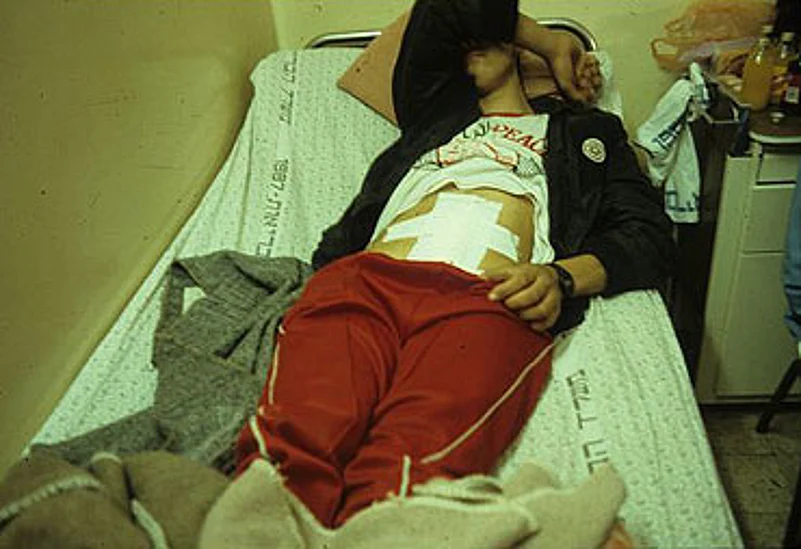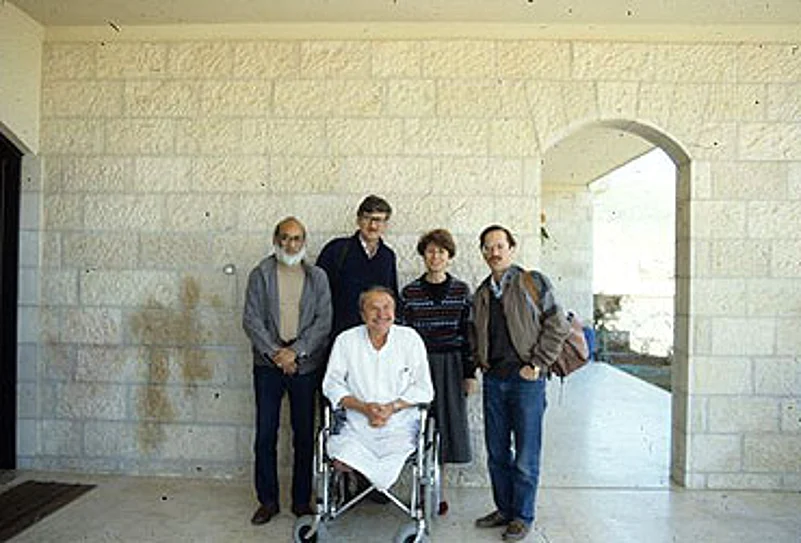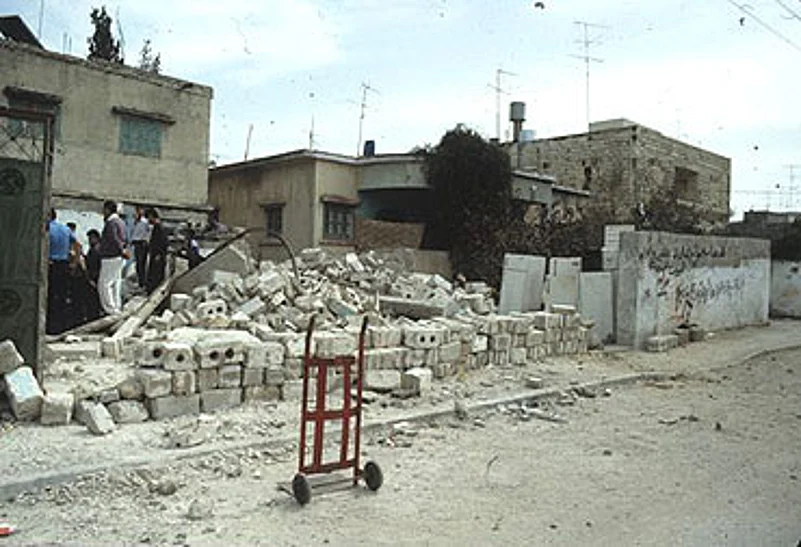The following essay, Two Days in Palestine,’ was written in April1989, soon after a brief trip to the occupied territories with some colleagues.It was published in two parts in the August 1989 (pp. 11–18) and September1989 (pp. 21–27, 36) issues of The Message International (New York),the monthly magazine published by the Islamic Circle of North America (ICNA).The editors, in their wisdom, changed the title to In the Eye of theIntifada, A Muslim’s Journey to the Land of Oppression; they also addedpictures and inserts of their own. Here is the original text, with some minorcorrections, and some pictures that I took during the trip
Advertisement
The first Intifada began in December 1987 and is generally considered tohave continued till the signing of the Oslo Accords in September 1993. Duringthat time Israeli security forces killed 1070 Palestinians in the OccupiedTerritories (including East Jerusalem), including 237 minors; in addition 54Palestinians, including 13 minors were killed by Israeli civilians. The Israelicasualties at the hands of the Palestinians during the same time were 47civilians, including 3 minors, and 43 army personnel. [Source: B'tSelem,the Israeli Information Center for Human Rights in the Occupied Territories,as viewed on 10 April 2009]
Introduction
There were six of us in the group: five academics from the University ofChicago and one lawyer. Five males and one female. One of us was a devoutCatholic, three claimed Islam as their religion, while the remaining twoidentified with Judaism. Four of us were American by birth; of the others onehad been an Indian and the other a Palestinian before settling in the UnitedStates. In these general terms we indeed formed a diverse group. What hadbrought us together was a common concern with the abuse of human rights in theOccupied Territories and the legitimate aspirations of the Palestinian people.We had come to the West Bank and Gaza -- some for the first time -- to discoverfor ourselves the faces, voices and landscape of the events we had been readingabout for some time. Our week - long trip was sponsored by the Palestine HumanRights Campaign (PHRC) in Chicago.
Advertisement
As we went through the Immigration at the airport in Tel Aviv each of us wasasked where he planned to stay. When the security discovered that the sixAmericans were all going to the same hotel in East Jerusalem, they became morecurious about our intentions. We told them we were on a ‘fact-finding’ tour,sponsored by the PHRC. After a brief delay they waved us on, out into thecheerful light of late afternoon where we were met by Kathy, a volunteer with aMaronite Christian organization.
It was near dusk when we entered Jerusalem. Kathy drove us to the Mount ofOlive to let us catch a glimpse of the great city in the final light of the sun,a breathtaking view. Closest to us was the Temple Mount or Haram Sharif, withthe golden Dome of the Rock dominating the entire scene. Millennia of historylay all around us. A hawker approached us. "4O picture cards for onedollar." Who could refuse such a bargain! But at that be-witching hour whennormally the panoramic spot should have been thronged with tourists and pilgrims-- we had arrived at the start of the Easter Week -- there were just six of us,sadly outnumbered by the vendors. No wonder the man, after he had sold us thecards, let loose a string of curses: "God damn Reagan!" "God damnIsraelis!
Our hotel in East Jerusalem also looked mostly empty and forlorn. Easterpilgrims had stayed away, frightened by all the news. The local Arabs sufferedmuch loss in income but I didn't hear anyone—Christian or Muslim—complain.When I brought up the subject with the service in the hotel, they merely noddedand said, "Yes, it's sad," and let it go at that. That evening, someof us walked over to American Colony Hotel for a drink. The streets were dark,soulless, not at all what one expected on a nice cool night in a Middle Easterncity. Even the fancier hotel turned out to be unusually quiet. When we returnedto the National Palace, we learned that there had been some terrible events inGaza: five Palestinians had been killed in just two days.
Advertisement
Starting the next day we followed a busy schedule. After an early breakfastwe'd get into a van or a large taxi and drive around with some guide from one ofthe human rights organizations. To different cities: Nablus, Baita, Qabatiya,Nazareth, Ramallah, Umm Fahm, Hebron, Gaza. To camps: Dheisha, Aida, andJabaliya. To hospitals, homes of the "martyrs," sites of demolishedhomes, offices of lawyers, activists and politicians—Israeli and Arab, Jewish,Christian and Muslim. Most days, on our return in the evening, we would find asmall group or two waiting for us: European volunteers, Israeli lawyers andpeace activists, representatives of smaller Palestinian organizations, includingwomen groups.
Advertisement
Some overall facts: Since the Intifada started in December 1987, close tofive hundred Palestinians have been killed, a great many of them in their teens.For every person killed one must count at least ten persons wounded. The rubberbullets that one reads about are not made of rubber, they are heavy metalbullets with a thin rubber coating. The plastic bullets are sharply pointed. Butthe key fact, which one doesn't see mentioned, is that they are all fired fromhigh velocity guns. The soldiers also use bullets, which shatter inside thebody. We saw a number of young boys with horrible abdominal wounds. The highimpact rubber bullets do not penetrate the body but they can shatter bones andalso cause severe neurological damage. Plastic bullets can penetrate the body;we saw an x-ray photograph where a plastic bullet had lodged in the skull of thevictim; in April 1989 one young boy died when a plastic bullet penetrated hisheart.
Advertisement

A teenaged boy wounded by a 'rubber bullet' in Gaza.
At any given time there are thousands of Palestinians in jail, some dulytried and sentenced but a many more held in what is euphemistically called"administrative detention." In every Arab town we visited there wereone or two prisons. The Israeli Army was present everywhere with soldiers postedon roofs at strategic points. Almost every one we talked to had had someexperience of detention and/or torture, and everyone that we met had had someclose relative in jail. We learned that anyone over the age of twelve wasconsidered an 'adult,' and could be—in fact many were—sentenced to jail.When children under twelve are arrested their parents must bail them out bypaying heavy fines, and if the parents can‘t pay the fine they are themselvesarrested. We saw several demolished houses. The owners had not been tried orsentenced; just a suspicion against one among the many living in the house hadbeen enough in each instance. When one house in a congested area is demolishedseveral other houses also get damaged. Needless to say, no one receives anycompensation.
Advertisement
One new thing we learned was that since January ‘89 the Israelis hadimposed a kind of 'war tax' on all Palestinians. It is in the shape of an extralevy, sometimes with the tax for license plates, sometime with other taxes. Andif anyone refuses to pay he cannot get even a birth certificate not to mention awork permit or a travel pass. Not only he, even his relatives are denied accessto these civil rights.
Most Palestinian males work in Israel; they may not spend the night in Israeland must return home. They pay union dues and insurance fees equal to theIsraeli workers but don't get equal benefits of health and job security. Thehospitals in the occupied territories are in sad shapes; they however pay hugeamounts to Israeli hospitals for all the cases they must refer to them. They cansave much by investing those amounts in improvements but cannot do so withoutthe permission of the Israeli authorities, which has always been refused.
Advertisement
All schools and universities in the Occupied Territories have now been closedfor over one year. They were closed by the army. Every attempt to start localschools is punished. The few lower level schools still functioning—and only inGaza, not in the West Bank—were run by the U.N. Consider this in the contextof the fact that traditionally the Palestinians have been the most highlyeducated among the Arabs. Not only the private schools are raided but also anyother project of a self-help kind. It is obvious that the Israeli army wouldlike to create a generation of uneducated, dependent people, whom they couldthen manipulate and exploit. One hears these days of the Israelis seeking totalk with local leaders and not finding any; we met four Palestinian mayors(Muslims and Christians) who were legally elected in 1976 and then deposed bythe Israelis in 1983 or earlier. We met Bassam Abu Shakar of Nablus who lostboth his legs when a bomb exploded in his car soon after he was elected asmayor; the bomb was planted by Israeli extremists. He is still full of fire. OnNew Year’s Eve his house was again raided and he and his wife were threatenedand abused by soldiers. He is a Muslim. In Ramallah when we arrived at the houseof its deposed mayor, Mr. Rantisi, a Christian clergy, he immediately showed usthe van of his nephew who had arrived minutes earlier. Its windshield had beenshattered by a rubber bullet and there were marks of other bullets on the van.Apparently some soldier had fired at his van from a rooftop as he was coming tovisit his cousin with his young son beside him.
Advertisement

The mayor of Nablus, Bassam Abu Shakar with the author from the left, two colleagues (Rashid Khalidi and Ralph Austen) and the mayor's wife.
Everywhere in the West Bank we saw new Jewish settlements. Even in the midstof the hellhole that is Gaza, the Israelis have set up three settlements, one ofthem a large, Club Med-type resort! Most settlements are built for purelystrategic reasons, on high hilltops overlooking Arab towns, main roads andpasses. There is a ring of such settlements around Jerusalem itself. Almostone-half of all land in the Occupied Territories is now under exclusive Israelicontrol under one guise or another: settlements, land attached to thesettlements, army posts, security zones, prisons, detention camps, etc. The newsettlements are not at all like the old kibbutz; they are onlybedroon1communities or in a few cases high-tech groups. Sadly enough, they seemalso to be favorites with American Jews.
Advertisement
For over one year now all stores in the Occupied Territories (including EastJerusalem) remain open only for three hours in the morning (9–l2); the onlyplaces exempted are factories and pharmacies. It was an eerie sight to see theclosed shops, the deserted streets, day after day. There may perhaps be somecoercion, but there is no doubt that it also has much popular support. It nodoubt causes a great deal of economic hardship, but the money sent in by the 3.5million Palestinians in the diaspora helps the local people carry the burden.Another, more significant, development is the emergence of all kind of self-helpgroups, consumer co-ops, women's craft-centers, etc. Some of these are frownedupon by the military authorities. The Intifada has also brought about tremendoustensions within the family, not only of the generational kind, but also betweenthe sexes. The patriarchy begins to loose its grip when women and children fightside by side with the men; in fact the women seemed to be doing a great dealmore to hold the families together. In any case, Palestinian women have alwaysbeen more educated and active compared with the rest of the Arab world.
Advertisement
The Intifada has also set up a challenge for the PLO and the diaspora. It hasa life of its own now and there is no way that someone from outside can stop it.It will stop only when some definite concessions are made by the Israeligovernment and when concrete plans are put into place towards the creation of anindependent Palestinian state in the territories. What was inspiring to see inthis regard was the cooperation between any number of Israelis and Palestinianstowards a negotiated peace. Unfortunately, not much of it gets reported in theAmerican press.
Lastly, mention must be made of the emergence of Islamic fundamentalism inPalestine as well as in Israel. At least on the surface these are two separatemovements. In the recent local government elections in Israel, the Arab town ofUmm Fahm elected a fundamentalist mayor. We met him as he sat in his tinyoffice, under the picture of the President of Israel. They are opening mosques,starting religious schools, making women wear 'modest' clothes and doing a greatdeal of community work. Previously the town had elected Communists. The mayorhad studied the writings of Maulana Maududi and Maulana Abul Hasan Ali Nadvi.When he learned that I was from India he asked me to convey his greetings toMaulana Nadvi. I couldn't tell him that the last thing I did on my most recenttrip to India was to write a rejoinder to one of the Maulana’s homilies toIndian Muslims.
Advertisement

A demolished house in Gaza. Demolished as collectivepunishment to the family of an accused Palestinian.
During that week we saw and heard much, some of it new, some alreadyfamiliar. But the critical experience was to see all of it for ourselves, tobehold specific names and faces with whom we palpably shared our humanity, tobreathe the same air as they did, to see the same shadows and walk the samestreets. Lifeless numbers became actual individuals; what was merely a name nowbecame the dead son of a mother whose angry tears we saw and can recall; "ademolished house" became a pile of concrete and stones that we felt underour feet and whose earlier residents served us tea in the one room they were nowliving in thanks to the generosity of a neighbor. Things were shown to us but wealso saw things on our own; people told us about their lives but also franklyanswered our questions.
Advertisement
What follows then is a detailed account of just two days: our first day inthe West Bank and our only day in the Gaza Strip. Obviously, these days were nottypical or representative. The five days not described here also taught us agreat deal. But my most urgent need is to share my experience with others now,and in a way that would bring them close to the actual words and sights. This iswhat I have sought here, and this is also what my limited time and talentallowed me to do. (The conversations are reconstructions based on extensivenotes; they are not verbatim.)
Advertisement
A Day In The West Bank: 20 March 1989
Our guide and chauffeur for our first full day in Palestine was Kathy, whowas waiting for us as we came out of the dining room of the hotel. She took usto the office of the Palestine Human Rights Information Campaign, where we werebriefed by Jane Abu Shakra. PHRIC has a total of l5 fieldworkers who gatherrelevant information, but two of them were at the time in prison and one under"administrative detention." A few had been confined to Gaza and could nottravel to Jerusalem, or anywhere else for that matter. Jane told us about theeffectiveness of the continuing strike—the decision to open stores for onlythree hours in the morning. (Factories, bakeries and pharmacies are exempted.)According to Jane, the West Bank and Gaza now imported from Israel onlyone-third of what it used to before. This must be a rude blow to Israel‘seconomy, since the Occupied Territories had been its chief market for twodecades, in fact a customer with no choice. Also: 20% to 25% of the Palestinianlabor force was staying away from their jobs in Israel. All this means a greatdeal of sacrifice and hardship on the part of ordinary people, and only showshow desperate their desire was to be rid of the occupation.
Advertisement
Jane also told us about the political scene in the Arab areas within theGreen Line -- the post-'47 Israel. Apparently the Communists have lost theirmonopoly of Arab support; a Progressive Party is trying to replace it, but --much more significantly -- a new Islamic Movement has suddenly gained majorprominence. There is an Islamic Movement (HAMAS) within the OccupiedTerritories, but the Islamic Movement in Israel itself acknowledges no ties toit; their goal seems to be a kind of autonomy for the Muslim Arab populationwithin the state of Israel. Its supporters have not taken any public position inre the Intifada, but they have sometimes provided relief supplies and such,choosing to work with local leaders. Jane told us about the Arab town of UmmFahm where the Islamic Movement gained a majority in local elections and nowruns the municipal administration. She praised their efforts to deal with civiccauses, their moral message, and their slogans of self-respect andself-sufficiency. I wondered about the attitude of the Israeli government. Willthey outlaw this new radical phenomenon? Or will it be patronized and then usedto create dissension between Christian and Muslim Palestinians?
Advertisement
Our next stop was the Maqassed Hospital, the largest health facility for theArab population of Jerusalem. That's where all the dying and the wounded of thedemonstrations in Jerusalem and the nearby camps are brought. We got a quicktour of some of the wards and talked with a few of the wounded.
Amar Abd-al-Latif Shakra was a shopkeeper in Nablus. One day he noticed sometrouble brewing on his street. Before he could close his shop he was attacked byfive soldiers. They knocked him down and beat him; since then he has beenparalyzed from the chest down. He had been in the hospital for more than fourmonths. Above his bed was a small poster showing the map of Palestine and a PLOflag. Amar talked with great passion about how God created all men equal andquoted from the Qur'an. "We want justice. We want only l/l000th of what hasbeen given to Israel." In Nablus he had been the sole provider for his sixchildren, his wife, and his old mother.
Advertisement
Salah Jabar had lived in Al-'Aroof camp all 20 years of his life. He was oneof eight brothers in his family, two of them in jail for "securityoffences." He was returning to the camp after visiting a friend at theMaqassed Hospital when the Border Police stopped him at the checkpoint.



















